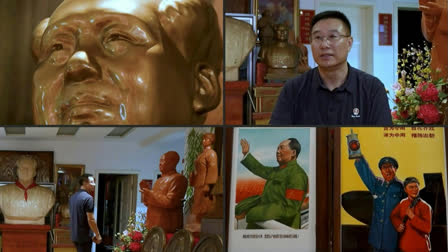Baotou (China):His car is laden with boxes of brightly-coloured communist memorabilia, Feng Gang places one more Chairman Mao figurine in the back seat and then steps back to admire his life's work.
Feng is one of China's leading "red collectors", hoarders of ephemera, mass-produced in the country's turbulent first decades as a Communist state up until the death of founding leader Mao Zedong in 1976.
This month, Feng joined hundreds of red collectors in the capital city showing off their wares ahead of the 75th anniversary of the founding of the People's Republic of China on October 1.
"I started to love red collecting in the third grade, starting with one memorial badge of Chairman Mao," Feng, 53, told AFP at his home in Baotou, Inner Mongolia.
"We had loudspeakers in the countryside at that time," he said of his youth in the poor, arid northwestern province of Gansu.
Feng was five years old when Mao died, bringing an end to a reign during which tens of millions of people died in brutal political persecution and economic policies that caused mass starvation.
"We could hear people talking about Chairman Mao from the loudspeakers, and we grew up singing 'The East Is Red'," Feng said, referring to one of China's most famous revolutionary songs.
Feng continued collecting badges, posters, statues of leaders and everyday items emblematic of the revolution and Mao era throughout a long career in the military.
Now heading a "red culture" sub-branch under the China Association of Collectors, in his retirement, Feng can devote even more time to his passion: promoting patriotic education of the nation's youth.
"If a citizen lacks conviction and doesn't love national heroes, the country will be in danger," Feng said.
Red nostalgia
China has in recent decades witnessed a resurgence of nostalgia for the Mao era -- despite its horrors -- due in part to its utopian official outlook and fervent patriotic spirit.
In Beijing's Panjiayuan, a sprawling commercial hub home to the city's top antiques market, hundreds of collectors from across China convened for an annual celebration of red culture.
Behind the glass, cases were displayed porcelain portraits bearing Mao's serene smile and badge once ubiquitous on clothing during his rule.
During the four-day event, enthusiasts and members of the public milled through an upstairs exhibition hall, gazing at the relics and reminiscing on a bygone era.
Dong Zhongchao, 60, told AFP he'd gathered the collectables "from all corners of the country" -- and claimed to have been offered 30,000 yuan ($4,273) for some "one-of-a-kind" items, which he turned down.
